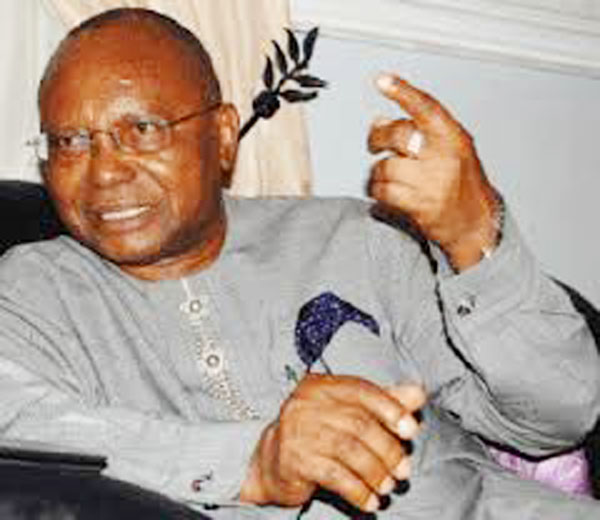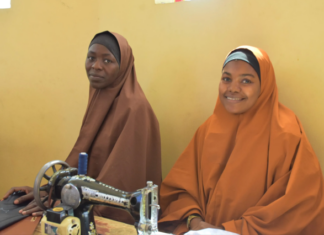On December 11, 2013, the National Universities Commission (NUC) honoured 17 professors with the Nigerian Universities Distinguished Professors Awards (NUDPA) at the Transcorp Hilton Hotel, Abuja.
Professor Anya Okoh Anya was one of the awardees.
The gathering included such intellectual powerhouses as Prof Martin Chike Aghaji, honoured for being the first Nigerian to successfully replace the aortic valve with a mechanical heart valve in 1987, Prof Dagogo Fubara, who got accolade for the development of ‘space geodesy’ and its application worldwide, including usage in tracking space car for United States Naval Weapons (1970-1975), Emeritus Prof Festus Ade-Ajayi, recognised for the best recorded scholarly work on the history of West Africa (1971), Prof Bolanle Awe (Arts), Prof Mark Okoro Chijioke (Engineering), Prof Umaru Gomwalk (Basic Medical Sciences), Prof Akinlawon Mabogunje (Social Sciences), among others.
Anya, applauded for the improvement of human health through discoveries in biology and ecology of helminthic parasites (1973), was asked to make a speech on behalf of others.
He protested. His reason being that he was undeserving of such honour where the likes of Mabogunje and Ade-Ajayi, members of the academic pantheon, a generation before his, were present.
That is how humble he is despite his great intellectual accomplishments. But his choice was neither mere coincidence nor a matter of good luck.
Of all the distinguished professors in that hall, Anya was the only one whose “boys” were also honoured.
Among them were Prof ABC Nwosu, former minister of health, praised for his exploits in the biological sciences, and the late Prof Celestine Onwuliri, given the award posthumously.
They were all members of the research team Anya set up at the University of Nigeria Nsukka (UNN). Onwuliri was his first PhD student.
Such was the transcendental influence of Anya, a chartered biologist, Fellow and past vice president of the Nigerian Academy of Science, Fellow of the Institute of Biology of the United Kingdom, Fellow of the Linnaean Society of London, Fellow of the Cambridge Philosophical Society, and former president, Union of African Biologists, that his “boys” still remember him with nostalgia.
Anya, himself, also remembers.
Told about Nwosu’s story a few years ago at the birthday of Prof Maurice Iwu, former Chairman of the Independent National Electoral Commission (INEC), of how they used to meet in his office at UNN, he smiles. “But we met more in my house and that was where they learnt how to drink good wine.”
Anya is a wine connoisseur, and at 80 he still drinks good wine. He loves good life without necessarily being bohemian. But he is much more than that. He is avant-garde; one of the sharpest minds Nigeria has ever produced.
In 1964, while a student in Britain, he established for the first time that the nematode cuticle is a modified collagen. That became one of his most outstanding discoveries.
In 1973 at his laboratory at UNN, he expanded the scope of that discovery by, again, identifying for the first time in a nematode the presence of neurotransmitter molecules.
As a result of his astonishing scientific discoveries, Anya remains the only African scientist to be honoured with an invitation to review this field of specialisation in the prestigious volume, Advances in Parasitology.
Born on January 3, 1937, in Abiriba, Abia State, he was educated at Hope Waddell Training Institute, Calabar; University College, Ibadan; and the University of Cambridge (St. Johns College), England, where he obtained a Doctor of Philosophy degree.
Perhaps, his greatest asset as a scholar is that despite his awe-inspiring accomplishments in the field of natural science, he is also at home in every other academic field.
His knowledge of Nigeria, its politics, failures and triumphs, is encyclopedic.
He agrees that Nigeria is once again at the crossroads and blames the civil war partly for the malaise.
“We have come a long way but we do not seem to have learnt any of the lessons we are supposed to have learnt, given our history,” he told me three years ago.
“We fought a war but the war did not involve the whole of Nigeria. Whether it was in Kaduna or Lagos, they still had their weekend parties as if nothing was happening.
“The war took place in the Eastern enclave and one of the consequences of going through that kind of experience is that when you have gone through war, you will understand that war is human being at his worst and nobody who had gone through a war would want it again.
“But because it was not a national experience, the lessons to be learnt from it have not guided our politics and have not guided our leaders. And that is why we are replaying in 2014, the politics of 1964 to 1966.”
Yet, Anya believes that in spite of the many difficulties, the country “has actually made a lot of progress.”
But “even the progress we have made, we do not appreciate it because what led to the progress was as if it was accidental. It was not planned for.”
How?
“Nobody in Nigeria’s history post-war has set out with a definite intention of building a nation.”
“The tragedy of Nigeria,” he insists, “is the fact that the war happened. But the war didn’t happen in a vacuum, it happened because attitudes that were not consistent with building a nation were very much in evidence.”
But, for him, the fact that “wherever you go, you will certainly see Nigerians holding their own everywhere,” is progress.
“The mistake we have made,” he, however, admits, “is that we have allowed our best to migrate to other places.
“The mistake we have made is that within the country itself, we have not allowed our best to be themselves and part of it is the cultural and structural relationship between the various peoples.”
Yet Anya’s patriotism is unrivalled. Despite the huge difficulties, his hope for Nigeria’s success is unwavering.
“I have a lot of hopes for Nigeria,” he says but decries the over dependence on foreign help in solving internal problems.
“We must have a leadership that thinks through our problems. That seems to be lacking. We don’t seem to have enough confidence in ourselves and we don’t seem to have a scale of priorities that puts Nigeria first and ability to do things for Nigeria.”
Regardless, he is confident that leadership will emerge sooner than later.
“It is already there. You see flashes of it here and there. As I say often, as I move around Nigeria, I have seen young Nigerians who have done fantastic things that their mates have not done elsewhere.”
But to achieve this, Anya says ethics have a central role to play both in the lives of individuals and the country. To underscore his point, he goes back to the relationship between him and his students.
“We were talking about my students earlier on. If we were working for what we will take, we wouldn’t have had the impact we had on ABC Nwosu, Celestine Onwuliri, et al, because there is a work ethic, an ethic that leads to achievement and success and it is not self-centred.
“It is not built on you as a person. It is built on what you see in the other person and what you can do for the society. In the process you reap your reward and that is also where we are failing in Nigeria.”
Indeed, if there is anyone qualified to be called a Nigerian patriot, Professor Anya Okoh Anya is. He loves Nigeria and demonstrates it at any given time.
Though retired, he is not tired as long as the call to duty has to do with service to fatherland.
In recent times, the former director general of the Nigerian Economic Summit Group (NESG) and president general of Ndigbo Lagos, had served in almost every committee set up by the government to find solution to the myriad problems plaguing the country.
He was a member of the post-2011 election violence committee, member of the national dialogue committee and a strong voice in the 2014 constitutional conference.
At 80, where does he get the strength to do all this?
He smiles, rather boyishly with his head tilted to the left while reaching out for a glass of red wine. “The vision of a great Nigeria inspires me,” he ripostes.
But his wife of 52 years, Inyang Anya, a biologist and retired director of education, says the secret behind his husband’s youthful look at 80 is his attitude to life.
“He is like a child at heart … he is a very simple person … if you don’t like him, he doesn’t notice. He just goes on. He’s a multi-faceted person … a very unusual person and there is nothing he puts his mind into that he doesn’t excel in.”
That is not the only confession she made about the man who courted her for eight years, a man she first saw when she was in primary school, yet her heart skipped a beat.
“He is a husband like no other. If an opportunity comes again for me to marry Prof, I would do it again and again and again.”
That, perhaps, is the greatest testimonial.













